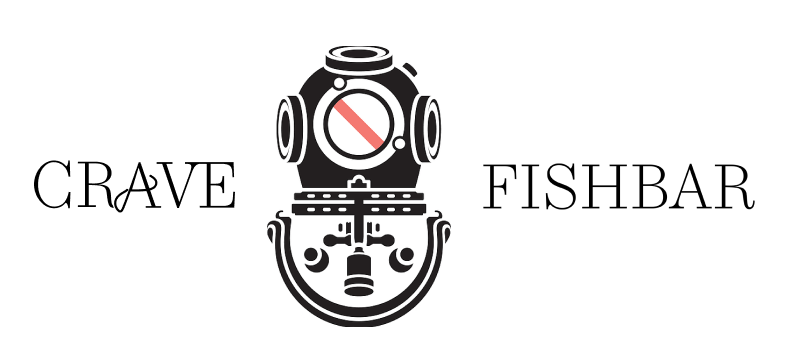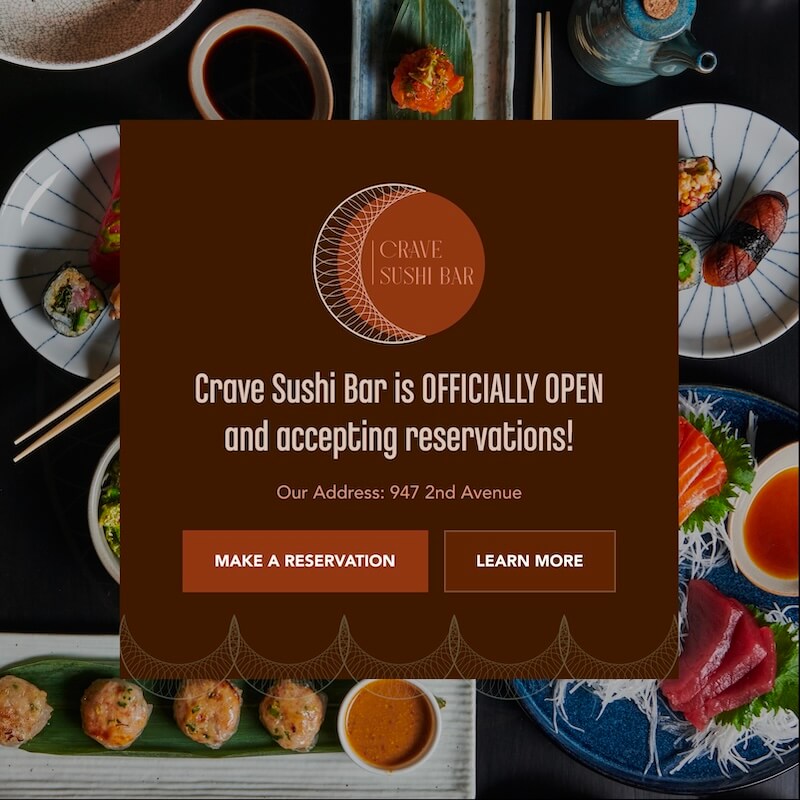As a creative, sustainable restaurant, we take a holistic approach to seafood–how our fish and shellfish tastes is undoubtedly important, but our focus isn’t limited to flavor. We view our restaurant and online market as part of a larger context. If you’re familiar with the Crave Fishbar brand, you already know we care about the health of our oceans. Sustainability and high quality are two of our top concerns, but we also care deeply about the health of our team and community.
You’ve probably heard that eating seafood is good for you. As it turns out, regularly including fish and shellfish as part of a balanced diet is one of the best things you can do for your health.
To spread awareness about the benefits of seafood nutrition, we’ve teamed up with the Seafood Nutrition Partnership, a national nonprofit on a mission to help Americans be healthy through the benefits of seafood. For the past six years, Chef Todd has been a chef ambassador for SNP. We’ve worked together on recipes, cooking demos, and events to promote seafood nutrition in our community.
Recently, we spoke with SNP’s Jessica Miller, a registered dietitian, to learn more about seafood benefits for overall wellness.

Is Seafood Healthy?
Seafood contains vital nutrients for overall wellness. While the shellfish tower or extra round of oysters at #Oystergram Happy Hour may seem like an indulgence, don’t worry, it’s good for your health.
Let’s take a look at what makes fish and shellfish so good for you.
“The most important benefit of seafood is its antiinflammatory properties – something you never really see but impacts every aspect of your health,” says Jessica. “The vitamins and minerals, amino acids, fatty acids, and antioxidants, all work together to be one of the healthiest foods for reducing the swelling that impacts everything from headaches to heart disease, radiant skin to better sleep.”
Seafood Nutrients
Calories and Protein
Seafood is a great foundation for a healthy meal because it’s low in calories and high in protein. Protein is essential for overall wellness. It strengthens our muscles and bones, increases metabolism, reduces hunger, and maintains energy and a healthy immune system. Fish and shellfish contain all of the essential amino acids for good health, making seafood a complete protein.
Icelandic cod, yellowfin tuna, shrimp, halibut, and fluke are all great low-calorie, high-protein options, but all seafood species offer these benefits.
Vitamins and Minerals
Another reason why seafood is a high-quality protein is that it contains a range of vitamins and minerals. Vitamins and minerals are vital to good health. Oily fish like salmon are great sources of vitamin A, which benefits the immune system, respiratory system, skin, and tissues. Both fish and shellfish contain a variety of B vitamins (B2, B6, B12), which promote blood health, muscle health, and support the immune system.
Seafood is also a natural source of vitamin D, which most foods do not organically contain. Jessica tells us, “There are really few foods that have vitamin D. One is mushrooms if they’re grown under a certain UV light, and the other is seafood. There’s nowhere else you can get it other than in a supplement, sunlight, or seafood, essentially.” Our bodies need vitamin D to absorb calcium, support our bone health, and ensure our immune system functions properly.
Fish and shellfish are also rich in calcium and other minerals, such as:
- Iron: vital for red blood cell health and production.
- Zinc: which helps make proteins and fight viruses and bacteria in the body
- Phosphorus: necessary for the formation of bones and teeth, as well as maintaining the health of cells.
- Magnesium: which regulates muscle and nerve function, blood pressure, and making protein, bone, and DNA.
Minerals also regulate hormones and keep the brain, heart, lungs, and overall body functioning properly.
Fat and Cholesterol
Consuming fat is necessary to maintaining a healthy diet, but there are good fats and bad fats.
Seafood contains high levels of omega-3 fatty acids, the good fats your body needs to stay healthy. This is one of the best reasons to include seafood in your diet. Among seafood’s many benefits, “The omega-3 component is something that really stands out,” Jessica says.
The two most essential omega-3 fatty acids are DHA (docosahexaenoic acid) and EPA (eicosapentaenoic acid). Our bodies can’t produce DHA and EPA on their own, so the best way to raise omega-3 fatty acid levels in the body is through a seafood-inclusive diet.
Omega-3s are powerful. They positively influence the body and mind in many ways, from childhood brain development to support your immune system, keeping your heart healthy, and helping you live a longer, healthier life. Combined, EPA and DHA help reduce inflammation and the risk of chronic disease and heart conditions. There are so many ways omega-3s help the body that we’ve detailed the specific areas in the following section.
Health Benefits of Eating Seafood
The health benefits of seafood contribute to both physical and mental wellness. Because fish and shellfish are rich in omega-3s, these foods support our major organs, immune system, and overall wellness.
Seafood Benefits for the Brain
No matter what age you are, eating seafood leads to improved brain function. The omega-3 fatty acids found in seafood are some of the most important molecules for cognitive performance, critical for brain health and development at any age.
In children, omega-3s from seafood lead to higher IQs and improved reading and spelling skills. In fact, studies show a strong correlation between women who consume seafood regularly during pregnancy and early brain function and intelligence in their children.
Later in life, omega-3s help maintain brain function in older adults. Consuming enough omega-3s helps the brain maintain healthy size and performance. A lack of DHA correlates with smaller brain size, a sign of accelerated aging.
Research also shows that seafood positively impacts our emotional health. People who regularly eat seafood are 20% less likely to suffer from depression than their peers. The American Psychiatric Association endorses the fats in fish to effectively treat depression. Research also supports that a seafood-inclusive diet can improve the performance of mental health medications like antidepressants.
Seafood Benefits for the Heart
Regularly eating seafood is one of the best things you can do for your heart, especially when replacing less healthy foods for seafood. The omega-3 content in fish and shellfish plays a powerful role in heart health, helping to lower blood pressure and heart rate, improve blood vessel function, and protect the heart from developing dangerous cardiac rhythm disturbances.
According to the American Heart Association, consuming seafood each week is proven to reduce the risk of congestive heart failure, coronary heart disease, ischemic stroke, and sudden cardiac death. It also benefits triglycerides, helps you maintain healthy blood pressure, and reduces inflammation.
You can extend heart-healthy benefits by serving fish and shellfish alongside other healthy foods like peas, beans, lentils, whole grains, fruits, vegetables, and nuts like almonds, walnuts, and hazelnuts.
Seafood Benefits for Skin
Consuming seafood helps skin stay healthy, hydrated, and youthful. The omega-3s in seafood, particularly EPA, may help the skin’s oil production and improve hydration. The amino acids found in seafood sustain collagen levels, a necessary factor in healthy and youthful-looking skin.
The B2 vitamin, found in all seafood, is one of the most important vitamins for healthy skin. B2 helps to fight free radicals and toxins, which can cause damage to the skin and accelerate the signs of aging.
Seafood Benefits for Eyesight
The omega-3 fatty acids in seafood also benefit our eyesight. The two-star fatty acids, DHA and EPA, are critical to our retina health, according to the National Institute of Health. DHA supports retina development and helps reduce macular degeneration caused by age. EPA helps reduce inflammation, which contributes to overall eye health.
Omega-3s also help keep the eye surface properly lubricated and healthy. When the eye surface is damaged or is not properly lubricated, there is a greater risk of vision problems.
Benefits for Immune System
Good nutrition and a balanced diet is the foundation of a healthy life. The nutritional content in fish and shellfish is essential to fighting chronic diseases and may help the body defend itself against viruses.
Being a complete protein, packed with vitamins, minerals, and omega-3s, seafood offers many benefits to the immune system.
Protein helps support the body’s healing and recovery against illness.
Vitamins A, B, and D regulate the immune system together by reducing inflammation, promoting red and white blood cell development, and keeping the immune system functioning properly.
Magnesium regulates immune cell development.
Potassium aids in the signaling of calcium in immune cells.
Zinc supports proper immune system functioning and may also help heal wounds.
SNP reports higher fish and omega-3 fatty acid intakes were significantly associated with lower total mortality. Eating enough seafood over time may help the quality and longevity of your health!
How Often Should You Eat Seafood?
Our friends at the Seafood Nutrition Partnership recommend two servings of seafood per week. “That’s about eight to twelve ounces a week,” Jessica says. Eating seafood twice a week ensures your body gets the most nutritional value that fish and shellfish have to offer.
How To Get The Most Out of Seafood Nutrition
To maximize all of the seafood’s health benefits, it’s important to remember that seafood must be a part of an overall balanced diet–including lots of fresh fruits and vegetables, whole grains, and healthy fats from foods like nuts and olive oil. Limiting sugar, saturated fats, refined grains, and processed or fast foods is just as important.
A healthy diet must also be part of a healthy lifestyle. Regular exercise, sleep, proper hydration, and effective stress management will keep you in optimum health.
Where To Buy Quality Seafood?
We know that shopping for high-quality, sustainable seafood can be daunting. We launched our online retail seafood market, Crave Fishbar Market, to help our community access healthy seafood to cook at home when dining out isn’t an option.
To help you shop with confidence, we’ve partnered with Monterey Bay Aquarium, a global leader in seafood sustainability and ocean science, and have established relationships with the local and global fishing communities to source the highest-quality sustainable seafood. When you order from our market, you can be sure that the products you’re purchasing are healthy, fresh, restaurant-quality, and always sustainable.
Special thanks to Jessica Miller and our partners at the Seafood Nutrition Partnership for sharing their expertise on the health benefits of seafood.











